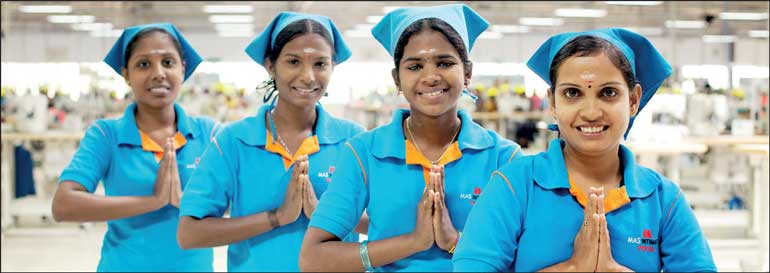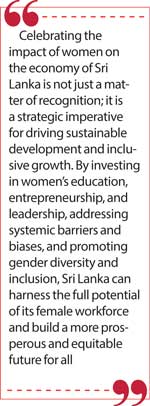Wednesday Feb 25, 2026
Wednesday Feb 25, 2026
Friday, 8 March 2024 00:32 - - {{hitsCtrl.values.hits}}

In Sri Lanka, companies that have embraced gender equality and diversity have reaped the rewards of a diverse workforce. For example, MAS Holdings, a leading apparel manufacturer in Sri Lanka, has prioritsed gender diversity and inclusion in its workforce, with women occupying key leadership positions across the organization
 International Women’s Day 2024 provides a timely opportunity to reflect on the significant contributions of women to the economy of Sri Lanka. From labor force participation to entrepreneurship and leadership roles, women play a crucial role in driving economic growth, fostering innovation, and building resilient communities. This article aims to highlight the latest data and statistics showcasing women’s contributions to the economy, explore the economic benefits of gender diversity and inclusion, discuss the challenges and barriers women face, showcase success stories of women entrepreneurs and leaders, examine the role of education and skills development, and call for continued efforts to promote gender equality and women’s empowerment in the economy.
International Women’s Day 2024 provides a timely opportunity to reflect on the significant contributions of women to the economy of Sri Lanka. From labor force participation to entrepreneurship and leadership roles, women play a crucial role in driving economic growth, fostering innovation, and building resilient communities. This article aims to highlight the latest data and statistics showcasing women’s contributions to the economy, explore the economic benefits of gender diversity and inclusion, discuss the challenges and barriers women face, showcase success stories of women entrepreneurs and leaders, examine the role of education and skills development, and call for continued efforts to promote gender equality and women’s empowerment in the economy.
Women’s contributions to the economy
Economic benefits of gender diversity and inclusion
Gender diversity and inclusion in the workforce bring numerous benefits to businesses and the economy as a whole. Research has shown that companies with diverse leadership teams and workforces tend to outperform their peers in terms of productivity, profitability, and corporate performance. A study by McKinsey & Company found that companies in the top quartile for gender diversity on executive teams were 25% more likely to have above-average profitability than companies in the bottom quartile.
In Sri Lanka, companies that have embraced gender equality and diversity have reaped the rewards of a diverse workforce. For example, MAS Holdings, a leading apparel manufacturer in Sri Lanka, has prioritsed gender diversity and inclusion in its workforce, with women occupying key leadership positions across the organisation. This commitment to gender equality has not only enhanced MAS Holdings’ reputation as a socially responsible employer but has also contributed to its success in the global market.
Challenges and barriers
Despite the progress made, women in Sri Lanka continue to face various challenges and barriers in accessing economic opportunities. Gender pay gaps persist, with women earning less than men for the same work. According to a study by the International Labour Organisation (ILO), the gender pay gap in Sri Lanka stood at 13.2% in 2023, highlighting the need for pay equity measures to address this issue.
Limited access to finance and resources is another significant barrier faced by women entrepreneurs in Sri Lanka. Women-owned businesses often struggle to access funding from financial institutions due to factors such as lack of collateral and discriminatory lending practices. This hinders their ability to start and grow their businesses, limiting their potential contribution to the economy.
Cultural biases and stereotypes also pose challenges for women in the workforce, with gender-based discrimination prevalent in hiring, promotion, and leadership opportunities. Addressing these deep-rooted biases requires concerted efforts from policymakers, businesses, and civil society to promote gender equality and create a more inclusive and equitable economy.
Success stories of women entrepreneurs and leaders
 Despite the challenges they face, women entrepreneurs and leaders in Sri Lanka have achieved remarkable success in their respective fields, contributing to job creation, innovation, and community development. One such success story is that of India’s Indra Nooyi, who served as the CEO of PepsiCo, one of the world’s largest food and beverage companies.
Despite the challenges they face, women entrepreneurs and leaders in Sri Lanka have achieved remarkable success in their respective fields, contributing to job creation, innovation, and community development. One such success story is that of India’s Indra Nooyi, who served as the CEO of PepsiCo, one of the world’s largest food and beverage companies.
Nooyi’s journey from humble beginnings to the pinnacle of corporate leadership serves as an inspiration to aspiring women entrepreneurs and leaders in the country. Her visionary leadership and commitment to diversity and inclusion have earned her widespread recognition and accolades, demonstrating the transformative power of women’s leadership in driving business success.
Role of education and skills development
Investing in women’s education and skills development is crucial for unlocking their full potential and bridging gender gaps in the labor market. Education empowers women with the knowledge, skills, and confidence they need to pursue meaningful careers and achieve economic independence. In Sri Lanka, efforts to promote girls’ education and vocational training have contributed to increased female participation in the workforce and improved economic outcomes for women.
Mentorship programs and networking opportunities also play a vital role in empowering women to succeed in the economy. By connecting women with mentors and role models who can provide guidance, support, and encouragement, these programs help women navigate the challenges they face and advance their careers.
Intersectionality and its implications
It is essential to recognise the intersectionality of gender with other dimensions of identity, such as race, ethnicity, and socioeconomic status, and its implications for women’s economic opportunities and outcomes. Women from marginalised and disadvantaged backgrounds face intersecting forms of discrimination and barriers to economic empowerment, exacerbating gender inequalities.
Addressing intersectional discrimination requires an inclusive approach that considers the unique experiences and needs of diverse groups of women. This includes implementing targeted policies and programs that address the specific challenges faced by marginalised women and promoting inclusive economic growth that benefits all segments of society.
Call to action
As we celebrate International Women’s Day 2024, it is imperative to acknowledge the progress made in advancing gender equality while recognising the work that remains to be done. To accelerate progress toward gender equality and empower women in the economy, policymakers, businesses, and civil society organisations must prioritise gender-responsive policies and initiatives. This includes:
By taking concerted action on these fronts, Sri Lanka can unlock the full economic potential of women, drive sustainable growth, and create a more inclusive and equitable society for all. On International Women’s Day 2024 and beyond, let us reaffirm our commitment to empowering women in the economy and accelerating progress towards gender equality.
In conclusion, celebrating the impact of women on the economy of Sri Lanka is not just a matter of recognition; it is a strategic imperative for driving sustainable development and inclusive growth. By investing in women’s education, entrepreneurship, and leadership, addressing systemic barriers and biases, and promoting gender diversity and inclusion, Sri Lanka can harness the full potential of its female workforce and build a more prosperous and equitable future for all. As we mark International Women’s Day 2024, let us commit to empowering women, accelerating progress, and creating a world where every woman has the opportunity to thrive and contribute to the economy and society at large.
References
Global Entrepreneurship Monitor (GEM) Report. (2023). Women’s Entrepreneurship in Sri Lanka: Trends and Insights.(https://www.gemconsortium.org/reports/womens-entrepreneurship)
Catalyst. (2023). Women on Boards: Sri Lanka. (https://thewia.org/catalysts/)
International Labour Organisation (ILO). (2023). Global Wage Report 2023/24: Wages and income inequality. .
McKinsey & Company. (2023). Diversity Wins: How inclusion matters.
MAS Holdings. (2023). Corporate Social Responsibility Report 2023.
World Economic Forum (WEF). (2023). Global Gender Gap Report 2023.
Department of Census and Statistics, Sri Lanka. (2023). Labour Force Survey 2023.
(The writer is a consultant.)